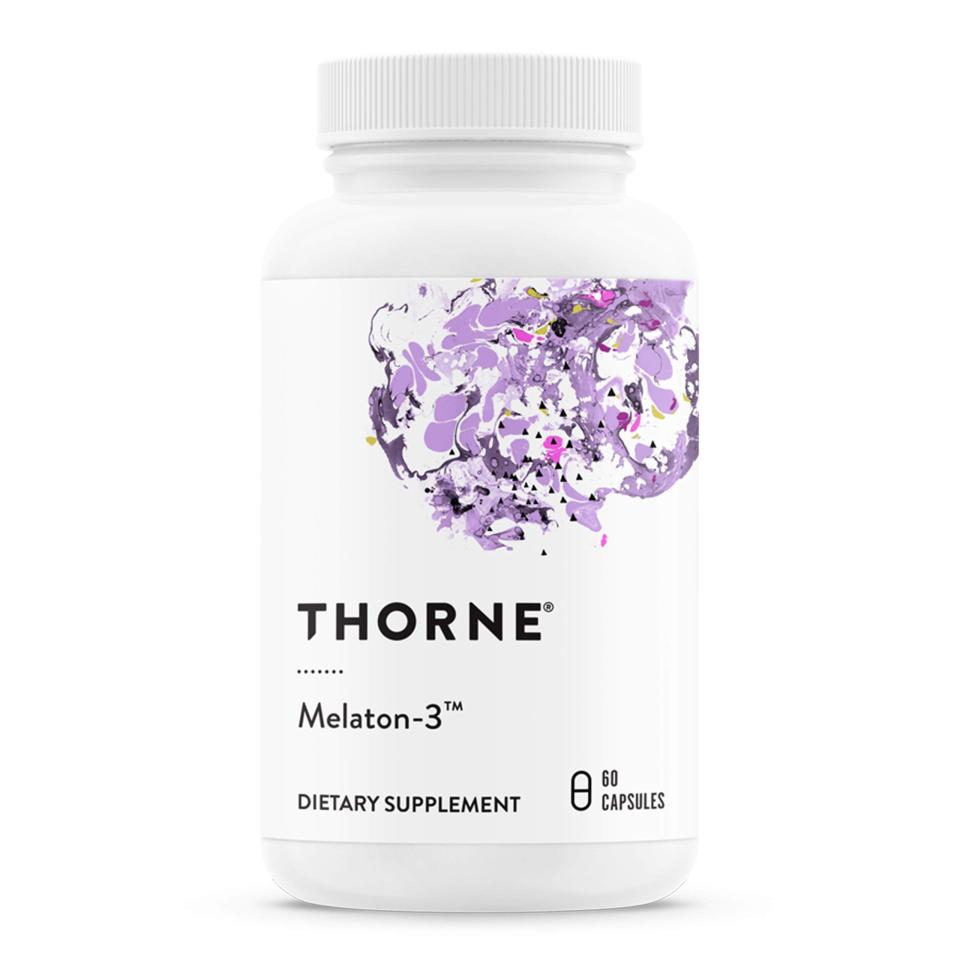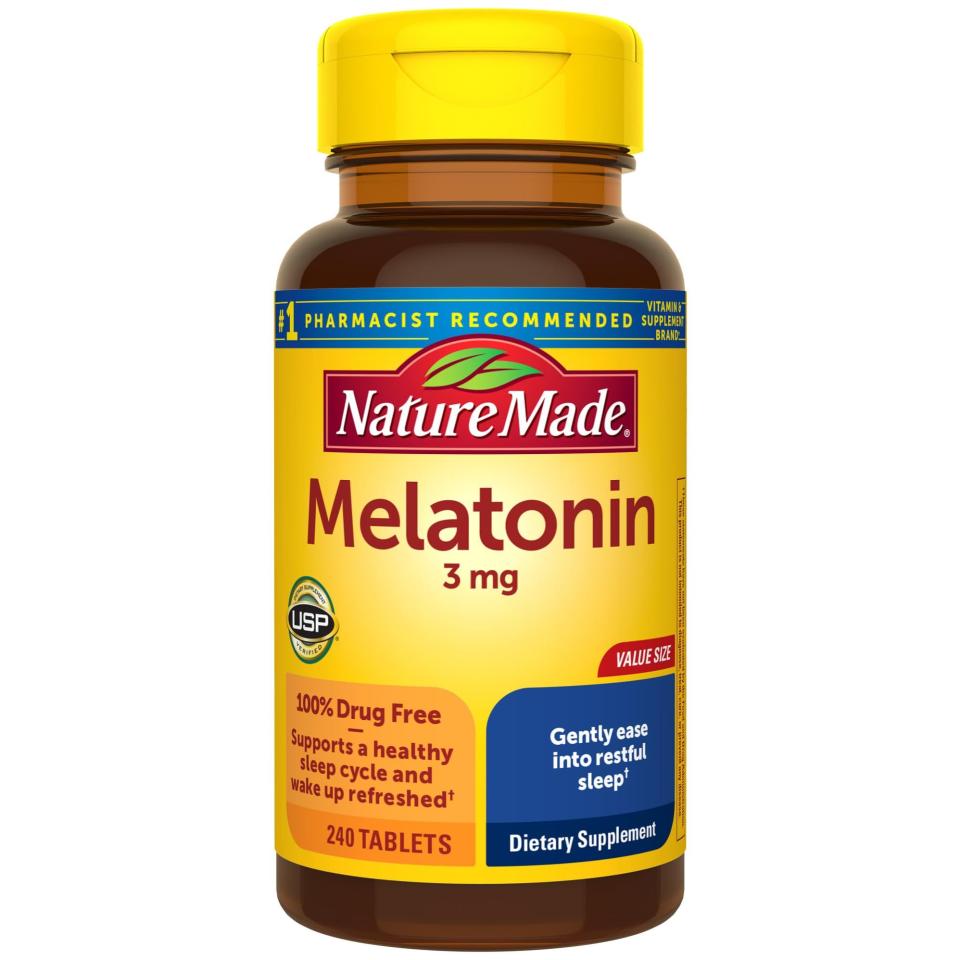Here's the Right Type of Magnesium to Take for Sleep

"Hearst Magazines and Yahoo may earn commission or revenue on some items through these links."
[table-of-contents] stripped
Magnesium is the mineral of the moment when it comes to helping you get more shut-eye –at least according to TikTok. Consider the magnesium-based “Sleepy Girl Mocktail,” flavored with tart cherry juice and prebiotic soda, that’s being pushed by flocks of influencers as a sleep aid. Is it all hype, though – or is magnesium really good for sleep, and the anxiety that might be keeping you awake?
The answer is… it may be, but we don’t fully know yet. “A small number of studies exist that investigate the relationship of magnesium supplement intake and sleep,” says Taylor C. Wallace, PhD, CFS, FACN, FAND, CEO of Think Healthy Group in Washington, DC, who teaches at George Washington University as well as at the Friedman School of Nutrition Science and Policy at Tufts University.
“One of the larger clinical trials of adults on average in their 60s showed that supplemental magnesium intake increased blood melatonin levels, and this could be a potential mechanism for why magnesium may be helpful for sleep,” Wallace says. (Melatonin is the hormone that’s in charge of your sleep-wake cycle.) It also might lead to better regulation of the sympathetic and parasympathetic nervous system, research shows, easing the mental and physical stress that may lead to issues that interfere with sleep.
What is magnesium?
Magnesium is a mineral nutrient that’s key for regulating your nerve function, blood sugar and blood pressure, according to the National Institutes of Health Office of Dietary Supplements (NIH). It’s also vital for the development of protein, bone and DNA.
Many people don’t get enough of the mineral through their diets, according to the National Institutes of Health, but it’s always best to get your nutrients through food rather than supplements. “Nuts like almonds and cashews, pumpkin and chia seeds, and dark green leafy vegetables like spinach are good sources of dietary magnesium,” says Wallace. Edamame, tofu, dark chocolate, Swiss chard, dal (some lentils, beans or peas) and quinoa are excellent magnesium-rich choices, according to Laura Iu, CDN, registered dietitian and owner of Laura Iu Nutrition in New York City.
But if you’re not getting enough through food, there are different types of magnesium available in supplement form. Speak to your doctor before taking a new supplement, of course.
Potential sleep benefits
Muscle relaxation: One thing it’s known for is its role in how our muscles work. A study by the University of Alabama, the University of North Alabama and Central Washington University found that magnesium can have a positive effect on various aspects of muscle performance. “Overall, magnesium helps promote muscle relaxation, which is important for achieving a peaceful night of sleep,” says Iu.
Improved anxiety levels: Magnesium also may calm your mind when you’re anxious before bedtime, says Iu. “Magnesium helps regulate gamma aminobutyric acid, also known as GABA, which is the brain's calming neurotransmitter,” she says. “This essentially inhibits brain activity, so that it’s easier to fall asleep.” And then there’s the melatonin factor: “Magnesium also helps convert tryptophan into melatonin, a hormone that’s responsible for signaling that it’s time to sleep.”
Which type of magnesium is best for sleep?
Magnesium glycinate is preferable, notes the Cleveland Clinic. This is in part because unlike other formulations, it is less likely to upset your stomach, one study found. If that's not available, look for magnesium citrate, says Iu.
Magnesium Glycinate 200 mg

Magnesium Glycinate 200 mg
amazon.com
$13.79
Magnesium Citrate 250 mg per serving

Magnesium Citrate 250 mg per serving
amazon.com
$13.99
“Typically, organic magnesium salts, like citrate, theonate and glycinate, plus magnesium chloride, are better absorbed by the body,” Wallace explains. “You should stay away from magnesium oxide, which is the most common form of magnesium on the market, but very poorly absorbed by the body.”
How much magnesium should I take for sleep?
Since there isn't a lot of research to determine how much you should take for sleep specifically, some doctors recommend that if you are taking a supplement, that you simply take it a half hour before bedtime. The amount you should take for sleep or any other purpose is something to work out with your healthcare provider, since it depends on what you eat as well as your age, sex and other factors.
These are the recommended daily amounts of magnesium from all sources (food, beverages, supplements, etc.), according to the NIH.
Adult women: 310-320 mg per day
Pregnant women: 350-360 mg per day
People who are breastfeeding: 310-320 mg
Adult men: 400-420 mg
Regardless of how much you take for sleep, your total intake of magnesium from only dietary supplements should not exceed 350 mg.
More FAQs
What’s the best time to take magnesium for sleep?
While you can take magnesium at any time of the day, taking it specifically for sleep means, that you should take it around a half hour before bed for best results, according to Cleveland Clinic.
Is it okay to take magnesium every night for sleep?
For most people, yes. The NIH says most adults can safely take up to 350 mg of magnesium daily in supplement form (your recommended daily amount may be higher, since it includes the magnesium in the food you eat).
Still, it’s key that you talk to your doctor before starting. If you have a kidney condition, too much magnesium can be toxic. Other potential issues: “Magnesium can bind with certain medications, particularly tetracycline and similar antibiotics, and prevent their full absorption,” says Wallace. It's a good idea to mention that you’re taking magnesium to your pharmacist as well.
Is magnesium or melatonin better for sleep?
According to the NIH's Center for Complementary and Integrative Health, melatonin is a hormone the body produces that makes you feel sleepy in response to darkness, and if your body doesn't make enough of it, a supplement may help. So if you want to create a more consistent nighttime sleep schedule, or if you’re shifting your sleep schedule because you’re in a new time zone, it might be your best bet. Magnesium enhances the level of melatonin in your brain in general, and relaxes your body, according to UC San Diego Health. Melatonin’s effect on sleep is better established by research, but if you try magnesium for sleep and find that it works for you, then use it instead. It’s really about your personal sleep goals, and what your doctor says is right for you.
THORNE Melaton-3-3mg

THORNE Melaton-3-3mg
amazon.com
$13.00
Melatonin 3mg

Melatonin 3mg
amazon.com
$9.19
Can too much magnesium cause insomnia?
Research suggests the answer is no. A Columbia University study found that participants who took magnesium were more likely to have better sleep quality, and less likely to experience short sleep duration. Still, it's important to pay attention to how it affects your body.
The bottom line: Magnesium may help you relax and get better sleep, but talk with your doctor about whether you should try to get more and if so, whether you should take a supplement.
You Might Also Like

